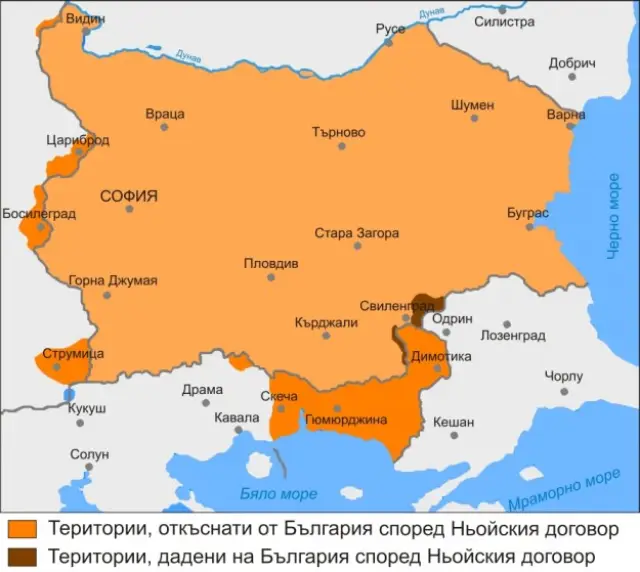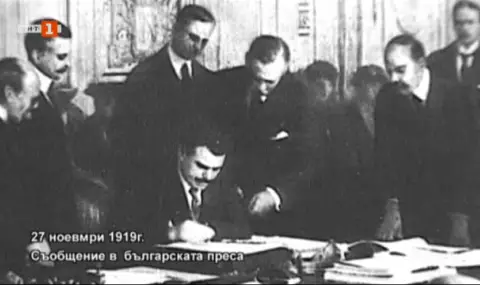On November 27, the Day of National Remembrance is celebrated. The date was included as significant in the calendar in 1996. at the suggestion of the national association "Mati Bulgaria". On this day in 1919, Bulgaria signed the Neue Peace Treaty, by virtue of which it lost about 10 percent of its territory and was imposed reparations and restrictions that were overwhelming for those times.
In the summer of 1919 Parliament sends a Bulgarian delegation to the Paris Conference of the countries that won the war. Bulgaria's first statesmen traveled and arrived like prisoners of war. They travel eight days by train to Paris without any comforts, having to pass through Belgrade, guarded all the time by officers and several battalions of Senegalese soldiers. They arrived in Paris on July 27 and for two months were not allowed to leave the hotel “Chateau de Madrid” without special permits issued with registration a day earlier.
At the beginning of March, the meetings of the commission, which deals with the Dobruja issue, with the Romanian-Bulgarian and Bulgarian-Serbian borders, begin. In mid-April, it became known that delegates from Bulgaria, Austria and Turkey would not be invited to the conference at which the preliminary contract would be signed.
At the beginning of June, Romanian, Serbian and Greek delegates prepare the conditions for the peace treaty with Bulgaria, to present them to the Council of the Four. Rumors are reaching Sofia that Bulgaria will lose its gains from the Balkan War to Greece. It is becoming more and more clear that all territories won at the cost of countless sacrifices will be taken from the Bulgarians. Moreover, even the protection of the old, pre-war borders of the state is in question. On June 18, Tsar Boris III issued a decree to repair the destroyed old border posts.
In Paris, the Serbian delegation promulgated a memorandum requesting an amendment to the border with Bulgaria. This amendment envisages Vidin, Belogradchik, Tsaribrod, Trun, Bosilegrad, Kyustendil, Strumica and Petrich to be annexed to the Kingdom of Serbia – not only from “strategic”, but also from “national” considerations.
Representatives of the USA oppose such vengeful treatment of the defeated, fearing that it will cause a new world war (as it happened in 1939), BNR recalls. President Woodrow Wilson insists on respecting his declared principle of ethnic self-determination of the territories in the post-war arrangement, even a Bulgarian border along the Midia-Rhodosto line is firmly supported by the US, but France and Great Britain reject the reasonable approach of the US, in response to this the president leaves the conference and allows only some of his employees to participate in it.
On November 27, 1919 the Neue Peace Treaty was signed. It was signed on the Bulgarian side by Prime Minister Alexander Stamboliyski in the town hall of the Paris suburb of Neuilly-sur-Seine and from there it bears its name, a symbol of one of Bulgaria's national catastrophes.
The Neue Peace Treaty was imposed on Bulgaria after its defeat in the First World War (1914-1918).
According to the Treaty of Neuilly, Bulgaria is burdened with heavy reparation obligations, amounting to 2,250,000 gold francs, which are to be paid within 37 years, after its entry into force, with 2% interest on the total amount for the first and 5 % for the following years. In addition, Bulgaria is obliged to hand over to its neighbors (allies of the victorious treaty powers: the Kingdom of Serbia-Croatia-Slovenia (since 1929 Yugoslavia), Romania and Greece), a certain number of livestock, as well as 250,000 t. coal.
Besides that, it lost Western Thrace, which was initially provided for administration by the Western Pact states themselves, which in turn in 1920. provide it to Greece. Southern Dobrudja is taken from Bulgaria, which is re-included in the territory of Romania, as well as the city of Strumica and its surroundings, together with called Western outskirts (including the lands of part of Tsaribrod, Bosilegrad, Trna and Kula okoliya) which are ceded to Yugoslavia. In this way, our country is deprived of significant territories inhabited by a compact Bulgarian population.
Bulgaria is not allowed to have modern military technology, navy and aviation, and compulsory military service has been abolished. The ground forces were not to exceed 33,000 men, including the police.
The Neue Peace Treaty lasted until the beginning of the Second World War (1939 - 1945). During this period, Bulgaria paid reparations in the amount of 65,000,000 gold francs to the treaty powers and their Balkan allies.
